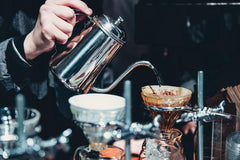What Kind of Water Is Best for Brewing Coffee?
 When deciding how to make the perfect cup of coffee, thought may be given to the variety of beans used, how they are ground, and type of brewing method, but one important factor often overlooked is the quality of water used to brew it. So what kind of water is best, tap, filtered, or bottled? The answer to that question is not so straightforward, but can depend on a number of things.
When deciding how to make the perfect cup of coffee, thought may be given to the variety of beans used, how they are ground, and type of brewing method, but one important factor often overlooked is the quality of water used to brew it. So what kind of water is best, tap, filtered, or bottled? The answer to that question is not so straightforward, but can depend on a number of things.
The mineral content of water, and other substances in it, can influence how chemical compounds in coffee are extracted when it’s brewed, and consequently how it tastes. Tap water contains magnesium and calcium, and sometimes less welcome additions from contact with domestic plumbing systems, as well as pesticides and bacteria. Chlorine is used as a disinfectant, and although deemed safe to drink, its taste can sometimes be detected. In some regions fluoride is added. When there are high levels of calcium and magnesium, the water will be harder, resulting in calcium bicarbonate deposits, or limescale. High bicarbonate levels may also give coffee a bitter taste. Most people know whether the water in their area is hard or soft, and those who live in hard water areas are only too aware of the damage a chalky build-up of limescale can cause, shortening the lives of kitchen appliances and blocking pipes. Various devices can be installed to soften water by removing calcium and magnesium, but while softer water may be kinder to household appliances, it can make your coffee taste rather flat; the sodium used in water softeners can also affect flavour.
With so many substances in tap water that could affect flavour, perhaps filtered water would be best? Many people opt to drink filtered water anyway for its taste, whether from an inexpensive pitcher filter, such as those made by Brita, or a pricier reverse osmosis water filter system. Brita use activated charcoal filters that remove or reduce undesirables, like chlorine, copper, lead and sediment, but not magnesium or calcium. Reverse osmosis systems use semi-permeable membranes that remove far more substances, including magnesium and calcium. However, it is possible for these minerals to be reintroduced to the water after it’s been filtered.
It is now understood that a good balance of minerals is actually necessary for optimum extraction of flavour from coffee compounds, and that to do away with them altogether would be a bad thing. It seems there is more of a Goldilocks principle when it comes to the right amount of hardness in water for coffee brewing, and that whilst a little calcium may enhance flavour, too much could spoil it. It has also been found that magnesium is particularly important for effective extraction.
Another option is bottled mineral or spring water. Mineral water flows through rocks, where it naturally picks up magnesium, calcium, sodium and potassium. Spring water is collected from natural aquifers, or underground springs in mountainous or hilly regions. It contains natural minerals, and may sometimes be filtered to remove pollutants. Brands of bottled water vary as to the amount of minerals in them, so it’s worth reading labels to compare, especially as some have higher levels of sodium, that are not so good for flavour.
Guidelines have been written to suggest the perfect balance of dissolved minerals and pH levels in water to achieve the best results when brewing coffee, but most people would rather not have to bother analysing their water and making adjustments and additions to it. All things considered, to make a flavoursome cup of coffee that does justice to the beans and doesn’t taste flat or bitter, it makes sense to use water that is fresh, cold, clear and free from impurities, chlorine, and other undesirable elements, with a good balance of magnesium and calcium. Whether you use tap, filtered or bottled, it may be necessary to do a bit of research and experiment to find the kind of water that works for you, but your efforts will be rewarded when you experience the amazing flavour, texture, aroma and mouthfeel of coffee at its best.

